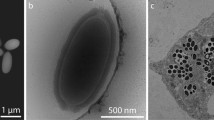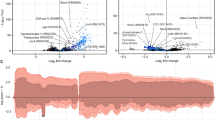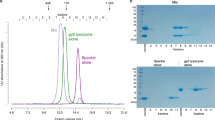Abstract
EARLY experiments on the biological effects of deuterium oxide indicated that the substitution of the pure substance for water resulted in cessation of growth in such diverse biological entities as tobacco seeds1, flatworms2, and mice3. When there was partial substitution of water by heavy water, growth was merely retarded. This retardation was attributed to an isotope effect resulting in lowered rates of reactions involving deuterium as compared to hydrogen4. The inhibition of tumour growth in animals the body water of which contained appreciable amounts of deuterium2,6 is another striking example of an isotope effect in which retardation of a biological reaction has been observed. Similar isotope effects have been observed in photochemical reactions4 as well as in yeast fermentation7.
This is a preview of subscription content, access via your institution
Access options
Subscribe to this journal
Receive 51 print issues and online access
$199.00 per year
only $3.90 per issue
Buy this article
- Purchase on Springer Link
- Instant access to full article PDF
Prices may be subject to local taxes which are calculated during checkout
Similar content being viewed by others
References
Lewis, G. N., J. Amer. Chem. Soc., 55, 3503 (1933).
Taylor, H. S., Swingle, W. W., Eyring, H., and Frost, A. H., J. Chem. Phys., 1, 751, (1933).
Barbour, H. G., and Trace, J., J. Pharmacol. Exp. Therap., 58, 460 (1936).
Lewis, G. N., Science, 79, 151 (1934).
Barbour, H. G., Allen, E., Gardner, W. V., Strong, L. C., Hamilton, J. B., Kirschbaum, A., and Barbour, jun., P. H., Amer. J. Cancer, 32, 440 (1938).
Katz, J. J., Crespi, H. L., Hasterlik, R. J., Thomson, J. F., and Finkel, A. J., J. Nat. Cancer Inst., 18, 641 (1957).
Pacsu, E., J. Amer. Chem. Soc., 56, 245 (1934).
Adams, M., ‘Bacteriophages’ (Interscience, New York, 1959).
Labaw, L. B., J. Bacteriol., 66, 429 (1953).
Putnam, F. W., Miller, D., Palm, L., and Evans, jun., E. A., J. Biol. Chem., 199, 177 (1952).
Author information
Authors and Affiliations
Rights and permissions
About this article
Cite this article
ROTHSTIEN, E., MANSON, L., HARTZELL, R. et al. Effects of Deuterium Oxide on the Synthesis of T5 and T7 Bacteriophages. Nature 184, 1167–1168 (1959). https://doi.org/10.1038/1841167b0
Issue Date:
DOI: https://doi.org/10.1038/1841167b0
Comments
By submitting a comment you agree to abide by our Terms and Community Guidelines. If you find something abusive or that does not comply with our terms or guidelines please flag it as inappropriate.



